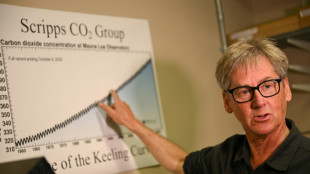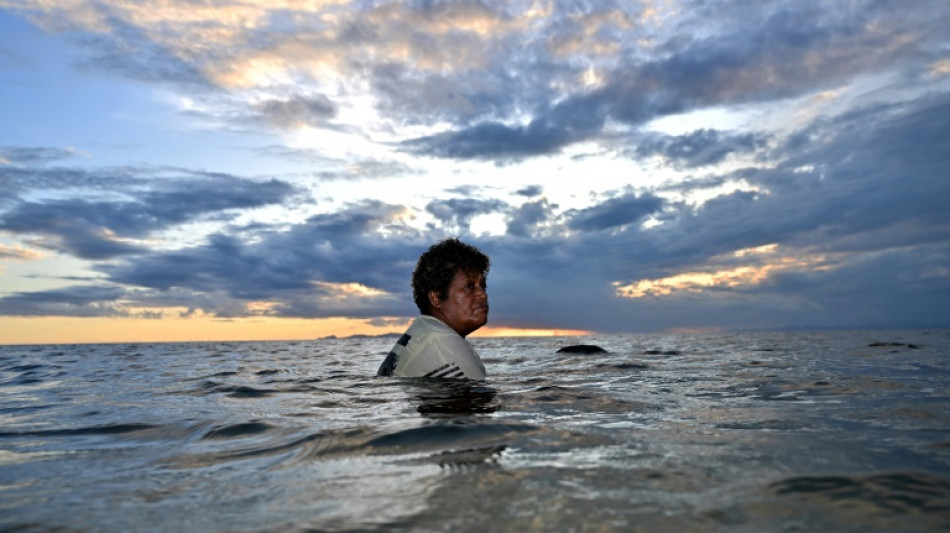
-
 A stadium and a jersey for Argentina's 'Captain' Francis
A stadium and a jersey for Argentina's 'Captain' Francis
-
New Trump task force vows to root out 'anti-Christian bias'

-
 Auto Shanghai showcases new EV era despite tariff speedbumps
Auto Shanghai showcases new EV era despite tariff speedbumps
-
Trump's administration moves to scrap artificial food dyes

-
 Musk to reduce White House role as Tesla profits plunge
Musk to reduce White House role as Tesla profits plunge
-
US official backs off promise to solve cause of autism by September

-
 Guardiola joy as Man City go third after dramatic win over Villa
Guardiola joy as Man City go third after dramatic win over Villa
-
Trump says has 'no intention' of firing Fed chief

-
 Jury finds New York Times did not libel Sarah Palin
Jury finds New York Times did not libel Sarah Palin
-
UN appoints envoy to assess aid for Palestinians

-
 Celtics star Tatum 'doubtful' for game two against Magic
Celtics star Tatum 'doubtful' for game two against Magic
-
Former England star Flintoff reveals mental battle after car crash

-
 Defending champion Korda chases first win of season at Chevron Championship
Defending champion Korda chases first win of season at Chevron Championship
-
Olmo fires Liga leaders Barca past Mallorca

-
 Nunes strikes at the death as Man City sink Villa to boost top-five bid
Nunes strikes at the death as Man City sink Villa to boost top-five bid
-
Tesla says profits plunge 71%, warns of 'changing political sentiment'

-
 WHO announces 'significant' layoffs amid US funding cuts
WHO announces 'significant' layoffs amid US funding cuts
-
PSG draw with Nantes to stay unbeaten in Ligue 1

-
 Trump's administration moves to ban artificial food dyes
Trump's administration moves to ban artificial food dyes
-
Gunmen kill dozens of civilians in Kashmir tourist hotspot

-
 US Treasury chief expects China tariff impasse to de-escalate
US Treasury chief expects China tariff impasse to de-escalate
-
I.Coast opposition leader Thiam barred from presidential election

-
 Top US court leans toward parents in case on LGBTQ books in schools
Top US court leans toward parents in case on LGBTQ books in schools
-
At least 24 killed in Kashmir attack on tourists

-
 Rahul powers Delhi to big win over Lucknow in IPL
Rahul powers Delhi to big win over Lucknow in IPL
-
Colombian cycling star 'Lucho' Herrera denies murder conspiracy

-
 Trump, Zelensky to attend Pope Francis's funeral Saturday
Trump, Zelensky to attend Pope Francis's funeral Saturday
-
US State Department to cut positions, rights offices

-
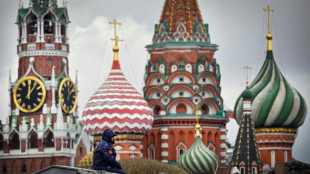 Ukraine ready for direct talks with Russia only after ceasefire: Zelensky
Ukraine ready for direct talks with Russia only after ceasefire: Zelensky
-
Myanmar Catholics mourn pope who remembered their plight

-
 Pope's Vatican 'family' pay tearful respects
Pope's Vatican 'family' pay tearful respects
-
The world leaders set to attend Pope Francis's funeral

-
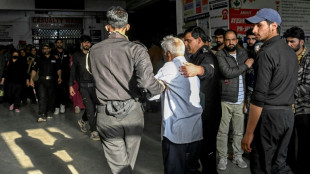 'Like a storm': Witnesses describe deadly Kashmir attack
'Like a storm': Witnesses describe deadly Kashmir attack
-
Volkswagen unveils its electric counter-offensive in China

-
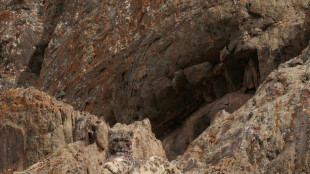 Landmark Nepal survey estimates nearly 400 elusive snow leopards
Landmark Nepal survey estimates nearly 400 elusive snow leopards
-
Napoleon letter auction recalls French pope detention

-
 Saka injury 'nothing serious' as Arteta weighs Arsenal options
Saka injury 'nothing serious' as Arteta weighs Arsenal options
-
Rubio to cut positions, rights offices at US State Department

-
 Trump says 'on the same side of every issue' with Netanyahu after call
Trump says 'on the same side of every issue' with Netanyahu after call
-
ECB's Lagarde hopes Trump won't fire US Fed chief Powell

-
 Gold hits record as Trump fuels Fed fears, Wall Street rebounds
Gold hits record as Trump fuels Fed fears, Wall Street rebounds
-
The world leaders set to attend Francis's funeral

-
 East Timor mourns Pope Francis months after emotional visit
East Timor mourns Pope Francis months after emotional visit
-
US envoy to visit Moscow as US pushes for ceasefire
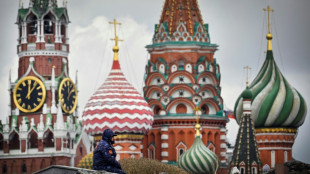
-
 At least 24 killed in Kashmir attack on tourists: Indian police source
At least 24 killed in Kashmir attack on tourists: Indian police source
-
Philippine typhoon victims remember day Pope Francis brought hope

-
 IMF slashes global growth outlook on impact of Trump tariffs
IMF slashes global growth outlook on impact of Trump tariffs
-
BASF exits Xinjiang ventures after Uyghur abuse reports

-
 Nordics, Lithuania plan joint purchase of combat vehicles
Nordics, Lithuania plan joint purchase of combat vehicles
-
Gold hits record, stocks diverge as Trump fuels Fed fears


Graves sink, fisheries shrink as climate change hits Fiji
The sea has already swallowed the village graveyard in Togoru, Fiji, and long-time resident Lavenia McGoon is dreading the day it claims her house.
She piles old rubber car tyres under the coconut trees that line the beachfront, hoping this makeshift seawall will at least buy some time.
The 70-year-old believes climate change, and the creeping ocean, will inevitably force her family to leave.
"Nobody can stop it," she tells AFP, as the tide sweeps in and crabs scuttle over the headstones.
"Nobody can stop water."
Togoru is a small settlement on the south coast of Fiji's largest island, Viti Levu.
It is one of dozens of coastal villages in the Pacific archipelago now confronting the reality of climate change.
McGoon, called "Big Nana" by locals, has spent almost 60 years here -- living on the shoreline in a basic wooden house without power or running water.
"We used to have a plantation right in front," McGoon says, pointing towards the sea.
"After 20 to 30 years we have lost almost 55 metres (60 yards) of land."
About 200 people were once buried in the Togoru graveyard, but McGoon says most of the remains have since been moved inland.
For now she refuses to follow, clinging on to her small piece of paradise.
"Relocation to me at this age, it's a bit too... sickening," she says.
- 'A big difference' -
Fiji has been meticulously preparing for the day it needs to relocate coastal villages because of climate change.
The scale of the challenge is enormous -- the government estimates more than 600 communities could be forced to move, including 42 villages under urgent threat.
More than 70 percent of the country's 900,000 people live within five kilometres (three miles) of the coast.
According to Australia's Monash University, sea levels have been rising in the western Pacific Ocean two to three times faster than the global average.
Entire low-lying nations such as Kiribati and Tuvalu could become uninhabitable within the next 30 years.
Fiji is fortunate that its highland regions make relocation a feasible option.
The settlement of Vunidogoloa, on the northern island of Vanua Levu, moved to higher ground in 2014 -- making it one of the first villages in the world to relocate because of rising sea levels.
Other villages, such as Veivatuloa, are exhausting their options for adaptation before abandoning their homes.
Veivatuloa lies about 40 kilometres west of the capital Suva and has a population of around 200 people.
The village's stilted houses sit in rows facing the water, while decaying wooden planks bridge the pools of seawater collecting on the ground at low tide.
The corrosive sea salt has eaten small holes into the walls of some buildings.
Veivatuloa has been lobbying the Fijian government to strengthen its old seawall, which is now regularly breached by waves.
Provincial spokesman Sairusi Qaranivalu says relocation is a painful idea for a village such as Veivatuloa, where customs are linked to the land.
"Once we take them away from the villages, it's like we are disconnecting them from the traditional duties they have to perform to their chiefs," he tells AFP.
"It's like deconstructing the traditional living and the way we live together."
The ocean is inching closer to the village, but elder Leone Nairuwai says he has to travel further out to sea to catch fish.
"When you used to go out to the sea you just go, I think, 20 yards (and) you catch the fish," he says.
"But now you take the outboard, it's a mile, and then you'll get a fish. There's a big difference."
- Shrinking catch -
About half of Fiji's rural population relies on fishing for survival, according to the United Nations Food and Agriculture Organisation.
But the country's fisheries are under pressure on multiple fronts.
Warmer seas are disrupting coastal ecosystems, while stocks of valuable species such as tuna have been plundered by foreign vessels.
Local guide and subsistence fisherman Abaitia Rosivulavula ekes out a living selling his catch to the restaurants around Pacific Harbour, a tourist hotspot dotted with luxury resorts.
He uses the sawn-off bottom of a plastic milk bottle to scoop water from his fibreglass boat before gunning the outboard motor towards a nearby reef.
Most of his bait is taken by sharks, and the handful of fish he manages to reel in before sunset are too small to get his hopes up.
"Before, it's plenty (of) fish," he tells AFP before casting his line again.
"Before, the size of the fish is big, now it's just like this," he adds, making a shrinking gesture with his hands.
Fiji is ranked 12 on the Nature Conservancy's Fisheries at Risk Index, which looks at "climate-related risk to coastal fisheries" in 143 countries.
Four other Pacific nations -- Micronesia, Solomon Islands, Vanuatu and Tonga -- sit inside the top 10.
Back in the settlement of Togoru, "Big Nana" McGoon says small countries like Fiji are being left to foot the bill while others refuse to reduce their emissions.
"They only think of money coming in," she says. "They never think of other people, the ones who will be suffering."
While McGoon wants to stay next to the sea for as long as she can, she's resigned to watching her grandchildren leave.
"I love this place. It's beautiful," she says.
"The only thing I'm telling my grandchildren... go to school and achieve your goals. Aim for overseas.
"Because the water will always take its course."
S.Keller--BTB

